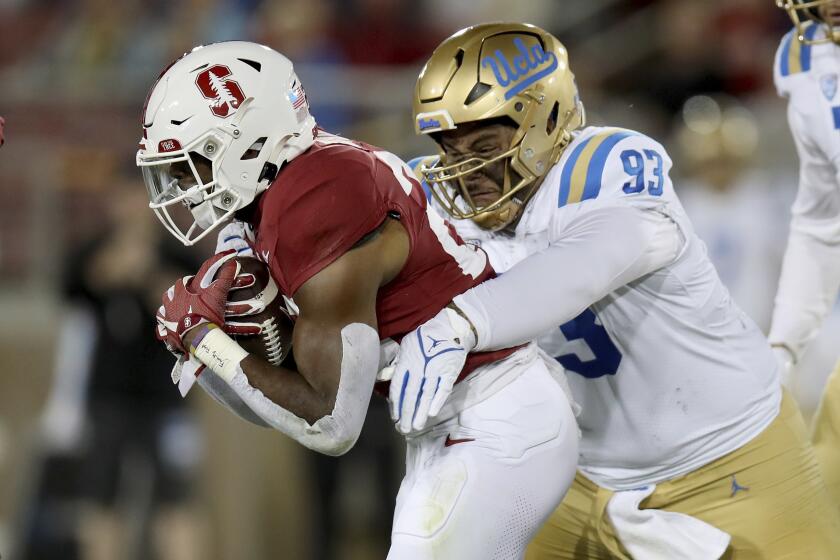Power conferences in college football gain even more strength

College football commissioners were going to end their three-day unity conference in Pasadena with a round of “Kumbaya” at the hotel’s valet carport. That was before the consulting firm that dreamed up “College Football Playoff” suggested something more generic from “The White Album.”
Ob-la-di, Ob-la-da.
Kidding aside, it was a good week, mostly, to be the kings.
The leaders from the power five conferences, led by the Southeastern Conference’s Mike Slive and the Big Ten’s Jim Delany, were masterfully able to convey the illusion of symbiotic overhaul. They scrapped the albatross Bowl Championship Series and consolidated power while selling that they were “giving fans what they want.”
They named the new four-team playoff that will begin in 2014 and put at bay, for years, the specter of litigation and an NFL-type playoff.
Somehow, the power brokers got everything they wanted and made it seem as if they were handing out blankets to the homeless.
The plan for the Big Ten, Pac-12, SEC, Atlantic Coast and Big 12 conferences to formally separate into their own super division is not necessary now because it happened already with a series of handshakes. So the weakened trudge on, nourished from a bird feeder.
The financial gap between the Power Five and the remaining “Group of 5” is enough to stave off any serious competitive threats. The annual difference in TV money alone is roughly $90 million to $17 million. Of the wounds suffered, a non-power commissioner said he was basically told to “rub dirt on it.”
The BCS had six major conferences; the College Football Playoff will have five. The Big East imploded and will be recast in the second division along with the Mountain West, Sun Belt, Mid-America and Conference USA.
The top champion of those five will be guaranteed one spot in one of the six major bowls.
The power leagues will no longer be restricted to two schools in the major bowls. That means the new four-team playoff, as determined by a yet-to-be-named selection committee, can be all SEC schools.
The deal-makers left Pasadena on Thursday convinced that college football will be fine with Jerry Jones replacing the Rose Bowl as the sport’s hood ornament.
The Rose Bowl was born 40 years before Jones (1902 versus 1942), but the Cowboys’ owner and his glitzy new stadium will be hosting title games for years to come, starting with the first one in January 2015.
The Rose Bowl lost much of its pride and autonomy when it joined the BCS in 1998, but it also got four national title games. The Rose in the new system is guaranteed four semifinal games in 12 years.
The upside to Pasadena never hosting another title game will be getting a traditional Pac-12 vs. Big Ten matchup three out of four years. No longer are there obligations to take outliers such as Texas Christian or Boise State.
The commissioners did not tie up all ends. They barely got around to formalizing the selection committee that will replace the BCS standings in 2014.
BCS Executive Director Bill Hancock said there’s no rush pinning down the details. “We need to get it right,” he said.
The leaders could, rightly, take a lot of positives out of this week:
•The heart of college football is moving back where it belongs — to New Year’s Eve and New Year’s Day. Starting in 2014, all six major bowls will be played on those two days (except when New Year’s falls on Sunday), including both national semifinals.
“Tripleheader followed by tripleheader,” Hancock said “It’s a dream come true.”
•The Cotton Bowl, left out of the BCS lineup, is back in the game thanks to Jones’ 100,000-seat edifice-a-go-go.
•The endless days of school poaching and conference realignment may have run their course. The ACC, protecting its flank, made news by announcing that all of its members agreed to “grant of rights” conditions. That means any school that leaves would have to continue to pay its television money to the ACC.
This puts to end rumors of Georgia Tech going to the Big Ten and setting off a new round of reconfiguration. “I think it has the potential to sort of cool the waters,” Big 12 Commissioner Bob Bowlsby said this week.
•The Little Guys got to live. Karl Benson ran the Western Athletic Conference for years, until it was pummeled into extinction. He now overseas a Sun Belt Conference that should have a revolving door as its logo.
“I’ve added seven schools this year and lost five,” Benson said.
The difference between the SEC and Sun Belt is astronomical, but Benson’s league, in the new structure, will make at least five times the $2 million it annually banked a decade ago.
Boise State’s epic win over Oklahoma in the Fiesta Bowl served as a showstopper and a door-stopper. “We added some value to the system,” Benson said, speaking on behalf of the have-nots, of that win.
The rich got richer, for sure, but at least those in the poorhouse were not foreclosed on.
“Louisiana Monroe still can play LSU,” Benson said. “That’s important to the university.”
More to Read
Get our high school sports newsletter
Prep Rally is devoted to the SoCal high school sports experience, bringing you scores, stories and a behind-the-scenes look at what makes prep sports so popular.
You may occasionally receive promotional content from the Los Angeles Times.







